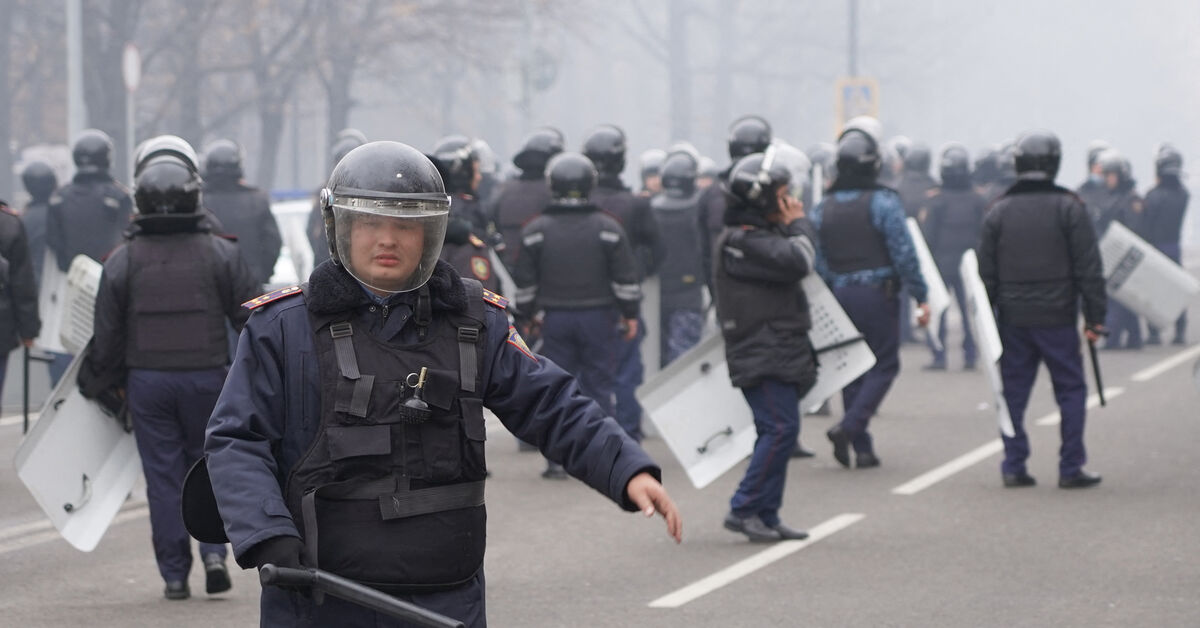Turkey has faced a stark beginning to 2022. Its foreign policy, which appeared to be triumphant and very effective in 2021, is suffering a rough start to the new year amid a currency meltdown and skyrocketing inflation at home.
The unprecedented and violent protests that erupted in Kazakhstan on Jan. 2 betrayed Turkey’s assertive foreign policy flaws perhaps more vividly than any other incident over the past three years. Oddly, the protests have hardly received the attention it deserves in Turkey because of the country’s highly consuming domestic political and financial situation.
In 2020, Turkey’s military and political role in Libya changed the course of the war in favor of the Tripoli-based forces in the country’s civil war. Turkey challenged France, Greece and the European Union during a standoff over conflicting territorial claims in the Eastern Mediterranean. In the fall of 2020, Turkey’s military, political and diplomatic support for Azerbaijan in the Nagorno-Karabakh war changed the balance of power dramatically in favor of Baku. Thus, with boosted Trans-Caspian ambitions extending to Turkic Central Asia via Azerbaijan, Turkey entered 2021 as a new revisionist power, albeit not on the same par with Russia and China.
Turkey has aimed to utilize the Cooperation Council of Turkic-speaking states to realize its ambitions in Central Asia. The brainchild of Kazakhstan’s former leader, Nursultan Nazarbayev, the council was planned in 2006 and launched in 2009. In accordance with its new political grandstanding, Turkish President Recep Tayyip Erdogan became the new chairman of the body in 2021 during a summit held in Istanbul on Nov. 12.
Erdogan’s staunch ally, the leader of Turkey’s arch-nationalist party, Devlet Bahceli, presented him a giant map of the Turkic world as a gift, encompassing big chunks of the Russian Federation, raising eyebrows in Moscow and irritating neighboring Beijing, which is busy with suppressing its Turkic minority, the Uyghurs.
Nevertheless, it took only two months for the Organization of Turkic States (OTS) to prove its impotence, manifesting Turkey’s irrelevance. On Jan. 2, Kazakhstan imploded. And Kazakhstan’s security establishment hasn’t knocked on the doors of the Turkic Council but instead on the doors of the Collective Security Treaty Organization (CSTO) to maintain its survival in the face of the rattling violence in its commercial capital, Almaty. The CSTO, which was founded in 1992 and is led by Russia, includes Kazakhstan, Kyrgyzstan, Tajikistan, Belarus and Armenia.
In a nutshell, the Kazakh leadership — at a time of urgent security needs — preferred Russia over Turkey and Vladimir Putin over Erdogan. Kazakhstan has special bonds with Turkey. The two countries as well as Azerbaijan have been the main pillars of the OTS. Kazakhstan had entered into a military cooperation agreement with Turkey that encompasses cooperation in several fields including the defense industry, intelligence-sharing, joint military exercises, information systems and cyber defense. The growing military ties between Turkey and Kazakhstan as well as Uzbekistan had given rise to a fanciful idea in October 2020 to establish a Turkic NATO.
Against such a backdrop, Kazakhstan’s choice to invite the CSTO instead of the OTS has a highly symbolic significance. The choice has also indicated that — unlike Azerbaijan’s Ilham Aliyev who did just the opposite almost a year ago during the war with Armenia over Nagorno-Karabakh — the Kazakh regime has been favoring Russia over Turkey at the expense of any prestige the OTS may have.
More striking than anything else and perhaps adding further insult to injury to Turkish nationalists was the deployment of Armenian soldiers and Russian special forces units to Kazakhstan upon the request of the Kazakh president. The announcement of the deployment came from Armenian President Nikol Pashinyan — a striking irony displaying the degradation of Turkey’s foreign policy.
What’s more intriguing is the anti-US and anti-Western obsession of certain secularist-nationalists and leftists in Turkey. For example, reacting to the unfolding developments in Kazakhstan, prominent retired Turkish Adm. Cem Gurdeniz blamed the unrest on “an imperialist plot.” Gurdeniz, who is also an ideologue of the controversial Blue Homeland doctrine that advocates more aggressive policy in the Mediterranean, claimed that the unrest stemmed from a “Soros-type provocation” that aimed to harbor “turmoil in Eurasia” and was organized by “imperialists very irritated from the foundation of the Organization of Turkic States.”
In social media, many Turkish leftists viewed similar opinions. Pro-Erdogan circles, in turn, citing a former Russian parliamentarian, claimed that followers of Fethullah Gulen, a US-based cleric who is accused by Turkey of staging a coup attempt in 2016, might be those fomenting trouble in Kazakhstan.
Erdogan was quick to support his Kazakh counterpart, Kassym Jomart Tokayev — the hand-picked successor of Nazarbayev. He rapidly expressed his support for Tokayev. However, Erdogan’s support of Tokayev was noticeably low-key. He did not pick up the issue much. Perhaps he was embarrassed by Tokayev’s choice of inviting CSTO troops, thereby undermining his prestige. Erdogan’s low-key support might be also linked to the uncertainty around Nazarbayev.
In an opinion piece in the Financial Times, Gideon Rachman wrote, “Kazakhstan is a country in which the average income is around $570 a month, but where the family of Nursultan Nazarbayev, who ruled the country from 1991 until 2019, has acquired foreign properties worth at least $785 million. The turmoil in Kazakhstan may be linked to infighting within ruling circles. But these kinds of problems are inherent to corrupt autocracies. If wealth is divided up as part of a spoils system, any hint of a change in leadership creates instability.”
On Jan. 5, Tokayev sacked and arrested long-time Nazarbayev loyalist Karim Massimov, head of Kazakhstan’s intelligence. He also dismissed Nazarbayev from his position as head of the National Security Council and appointed himself as the new head.
Turkey seems to have lost track of the developments in Kazakhstan. Almost two weeks after the unrest, Turkey’s Foreign Minister Mevlut Cavusoglu gathered a conference of the foreign ministers of the OTS. In a speech on Jan. 11, he expressed satisfaction that the situation in Kazakhstan was brought under control, without mentioning that the shaky control was maintained by a Russian-led military intervention.
“Kazakhstan has a state tradition, experience and ability to overcome the current crisis,” Cavusoglu said.
Putin, for his part, was opaque in praising the role the military troops played in suppressing anti-government protests in Kazakhstan. “We won’t let anyone destabilize the situation in our home,” the Russian president said. His remarks were a reflection of the irrelevance of Turkey and the OTS led by Erdogan at a critical juncture of the Turkic world.
It also is a stark indicator of the changed fortunes of Turkey in its assertive foreign policy. The Kazakhstan crisis represents a defeat of Turkish nationalism on foreign policy.
Source:Al-Monitor
***Show us some LOVE by sharing it!***



